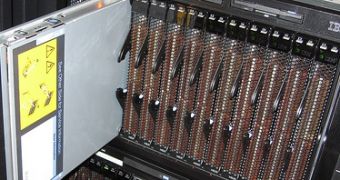US-based conglomerate IBM plans to unveil a revolutionary encoding technology, that would make it possible to stream HD media at up to 3Mbps speeds across the web. The new technology has been developed in collaboration with the software firm Broadcast International.
According to a joint statement prepared by the two partners, the encoding technology will be premiered at the upcoming National Association of Broadcasters conference in Las Vegas. The innovative system is based on the software developed by Broadcast International that runs on an IBM BladeCenter server platform equipped with the company's Cell processors.
At the moment, the vast majority of HD streams are broadcast as MPEG 2 standard of 19.4 Mbps. The software algorithm would compress the MPEG-2 streams to under 3 Mbps, which would account not only in higher data transfer rates, but also in important bandwidth savings (more than 80 percent for HD quality), as well as in more concurrent connections.
"The ability to squeeze more video onto less bandwidth is the number one priority in the industry," said Rod Tiede, CEO of Broadcast International. "Even a 20 percent reduction in bandwidth is seen as a breakthrough. Our demonstrations shatter the bandwidth barrier completely, offering unprecedented compression and transcoding in both live and real-time environments. That's the industry's holy grail."
The technology will be demonstrated later this week during the NAB expo and show. According to Broadcast International, the demonstration will include the emulation of a production broadcast environment with multiple types of content, such as live sportscasts or archived footage. The two companies will perform real-time encoding and transcoding, then deliver the achieved signal to cellphones, laptops, and large-screen format HDTVs.
IBM's Cell chips, currently powering Sony's PlayStation gaming consoles, will play a key role in the encoding and transcoding parts, as the algorithms are extremely resource-intensive.
"Right now there are literally billions of dollars in video compression infrastructure that will have to be thrown away when new standards like h.264 are adopted," said Tiede. "You don't have to throw out your computer every time Microsoft launches a new version of software. Why should you have to throw away a $50,000 piece of equipment like an encoder," he concluded.

 14 DAY TRIAL //
14 DAY TRIAL //